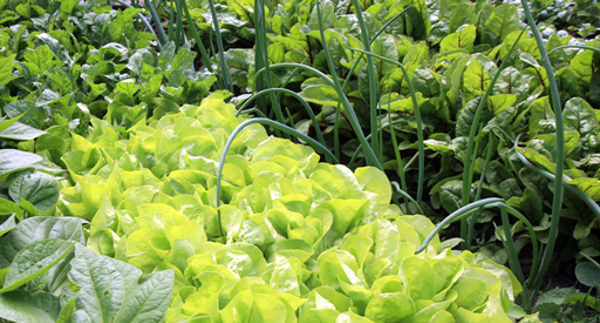
Companion planting is the practice of grouping garden plants together so that they can help each to grow better, and also help deter insects enjoying your crops before you get the chance to. Over winter there are a number of plants you can grow together for garden success. Discover top winter companion plants below.
WINTER COMPANION PLANTS:
- Plant dill and rosemary next to broccoli.
- Grow carrots and leeks together. Both have strong scents that drive away each other’s pests.
- Cauliflower enjoys celery, oregano and peas.
- Garlic planted among roses will help deter aphids.
- Cabbage enjoys being planted with beetroot, celery, potatoes, sage and any other strong-smelling herbs.
- Companions plants for spinach include cauliflower and celery.
- Radish don’t enjoy brassicas but beans, carrots and peas are suitable companions.
- Plant onions with broccoli, cabbages, lettuces and strawberries.
- Nasturtium attracts caterpillars, aphids and whitefly, so planting it alongside or around vegetables such as lettuces and cabbages will help protect them. The adults will lay the eggs on the nasturtium leaves instead. The nasturtium can be pulled while the eggs are at a junior stage to rid the garden of this cycle.
- Sage is a great herb to plant around celery crops as it helps to keep aphids away.
- Borage is a great companion for your strawberries.
- Avoid planting strawberries with cabbage, Brussels sprout and broccoli.
- Calendula (also known as English marigold) is a wonderful companion plant that attracts beneficial insects including hoverflies and ladybirds which prey on aphids. It also attracts bees and butterflies into the garden. Silverbeet, radish, carrot and parsley in particular like the company of calendula.
TOP TIPS
- Make sure companions are planted at the same time as your edible crops in order to prevent insects from taking over the vegetable patch.
- Plant vegetables in Tui Vegetable Mix, which contains the right blend of nutrients to provide your veges with the best possible start and sustained growth throughout the season. Fertilise every four weeks during key growth period with Tui Vegetable Food to encourage healthy vegetable growth.
- Plant herbs in Tui Herb Mix a free draining planting mix, rich in nitrogen to promote green, leafy growth and continuous harvesting. Feed your herbs with Tui NovaTec Premium fertiliser.
View our full companion planting table >
Excerpts taken with permission from The Tui NZ Vegetable Garden 3rd Ed. by Rachel Vogan.
When should I plant
in
Loading...
Post a comment
Winter Companion Plants Comments
I just noticed your comments with regards to companion planting mentions Nasturtiums attract caterpillars and I believe it should read detracts caterpillars. Just my thoughts and I do enjoy you tips and products.
Laurie
Hi Laurie, thank you for your feedback. Nasturtiums are a 'trap', they contain an oil that attracts insect pests such as caterpillars, white fly and aphids. Caterpillars are attracted to the plant and lay their eggs, the eggs need to be destroyed before they hatch. By planting nasturtiums insect pests are drawn away from desirable plants.
Lianne, Tui Team